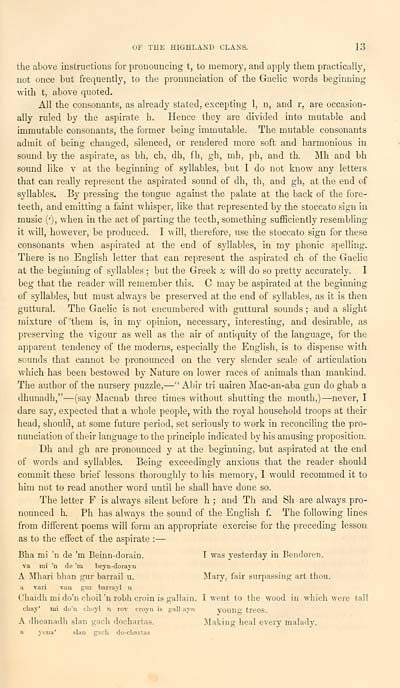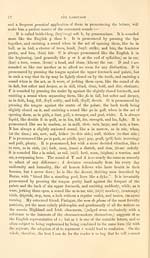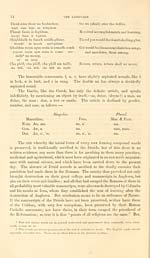Download files
Complete book:
Individual page:
Thumbnail gallery: Grid view | List view

OF TUE HIGHLAND CLANS. 13
the above icstructions for pronouncÌDg t, to memory, and apply them practically,
not once but frequently, to the pronunciation of the Gaelic words beginning
with t, above quoted.
All the consonants, as already stated, excepting 1, n, and r, are occasion-
ally ruled by the aspirate h. Hence they are divided into mutable and
immutable consonants, the former being immutable. The mutable consonants
admit of being changed, silenced, or rendered more soft and harmonious in
sound by the aspirate, as bh, ch, dh, fh, gh, mh, ph, and tb. Mh and bh
sound like v at the beginning of syllables, but I do not know any letters
that can really represent the aspirated sound of dh, th, and gh, at the end of
syllables. By pressing the tongue against the palate at the back of the fore-
teeth, and emitting a faint whisper, like that represented by the stoccato sign in
music ('), when in the act of parting the teeth, something sufficiently resembling-
it will, however, be produced. I will, therefore, nse the stoccato sign for these
consonants when aspirated at the end of syllables, in my phonic spelling.
There is no English letter that can represent the aspirated ch of the Gaelic
at the beginning of syllables ; but the Greek z will do so pretty accuratelj'. I
beg that the reader will remember this. G may be aspirated at the beginning
of syllables, but must always be preserved at the end of syllables, as it is then
guttural. The Gaelic is not encumbered with guttural sounds ; and a slight
mixture of them is, in my opinion, necessary, interesting, and desirable, as
preserving the vigour as well as the air of antiquitj- of the language, for the
apparent tendency of the moderns, especially the English, is to dispense with
sounds that cannot be pronounced on the very slender scale of articulation
which has been bestowed by Nature on lower races of animals than mankind.
The author of the nursery puzzle, — " Abir tri uairen Mac-an-aba gun do ghab a
dhunadh," — (say Macnab three times without shutting the mouth,) — never, I
dare say, expected that a whole people, with the royal household troops at their
head, should, at some future period, set seriously to work in reconciling the pro-
nunciation of their language to the principle indicated by his amusing proposition.
Dh and gh are pronounced y at the beginning, but aspirated at the end
of words and syllables. Being exceedingly anxious that the reader should
commit these brief lessons thoroughly to his memory, I would recommed it to
him not to read another word until he shall have done so.
The letter F is always silent before h ; and Th and Sh are always pro-
nounced h. Ph has always the sound of the English f. The following lines
from different poems will form an appropriate exercise for the preceding lesson
as to the eflect of the aspirate :—
Bha mi 'n de 'm Beinn-dorain. I was yesterday in Beiidoren.
va mi 'n de 'm beyn-dorayn
A Mbari bhan gur barrail u. Mary, fair siirpasf3Ìug art thou.
a van van gur barrayl u
Chaidh mido'n clioil 'n robh croin is gallain. I went to the wood in which were tall
chay' mi do'n choyl n rov croyu is gall-ayii youiio' trees.
A dheanadli slan o-ueh doehartas. Makhig heal every malady.
a rcma' slaii gach do-cliavlas
the above icstructions for pronouncÌDg t, to memory, and apply them practically,
not once but frequently, to the pronunciation of the Gaelic words beginning
with t, above quoted.
All the consonants, as already stated, excepting 1, n, and r, are occasion-
ally ruled by the aspirate h. Hence they are divided into mutable and
immutable consonants, the former being immutable. The mutable consonants
admit of being changed, silenced, or rendered more soft and harmonious in
sound by the aspirate, as bh, ch, dh, fh, gh, mh, ph, and tb. Mh and bh
sound like v at the beginning of syllables, but I do not know any letters
that can really represent the aspirated sound of dh, th, and gh, at the end of
syllables. By pressing the tongue against the palate at the back of the fore-
teeth, and emitting a faint whisper, like that represented by the stoccato sign in
music ('), when in the act of parting the teeth, something sufficiently resembling-
it will, however, be produced. I will, therefore, nse the stoccato sign for these
consonants when aspirated at the end of syllables, in my phonic spelling.
There is no English letter that can represent the aspirated ch of the Gaelic
at the beginning of syllables ; but the Greek z will do so pretty accuratelj'. I
beg that the reader will remember this. G may be aspirated at the beginning
of syllables, but must always be preserved at the end of syllables, as it is then
guttural. The Gaelic is not encumbered with guttural sounds ; and a slight
mixture of them is, in my opinion, necessary, interesting, and desirable, as
preserving the vigour as well as the air of antiquitj- of the language, for the
apparent tendency of the moderns, especially the English, is to dispense with
sounds that cannot be pronounced on the very slender scale of articulation
which has been bestowed by Nature on lower races of animals than mankind.
The author of the nursery puzzle, — " Abir tri uairen Mac-an-aba gun do ghab a
dhunadh," — (say Macnab three times without shutting the mouth,) — never, I
dare say, expected that a whole people, with the royal household troops at their
head, should, at some future period, set seriously to work in reconciling the pro-
nunciation of their language to the principle indicated by his amusing proposition.
Dh and gh are pronounced y at the beginning, but aspirated at the end
of words and syllables. Being exceedingly anxious that the reader should
commit these brief lessons thoroughly to his memory, I would recommed it to
him not to read another word until he shall have done so.
The letter F is always silent before h ; and Th and Sh are always pro-
nounced h. Ph has always the sound of the English f. The following lines
from different poems will form an appropriate exercise for the preceding lesson
as to the eflect of the aspirate :—
Bha mi 'n de 'm Beinn-dorain. I was yesterday in Beiidoren.
va mi 'n de 'm beyn-dorayn
A Mbari bhan gur barrail u. Mary, fair siirpasf3Ìug art thou.
a van van gur barrayl u
Chaidh mido'n clioil 'n robh croin is gallain. I went to the wood in which were tall
chay' mi do'n choyl n rov croyu is gall-ayii youiio' trees.
A dheanadli slan o-ueh doehartas. Makhig heal every malady.
a rcma' slaii gach do-cliavlas
Set display mode to: Large image | Transcription
Images and transcriptions on this page, including medium image downloads, may be used under the Creative Commons Attribution 4.0 International Licence unless otherwise stated. ![]()
| Early Gaelic Book Collections > Blair Collection > Treatise on the language, poetry, and music of the Highland clans > (25) |
|---|
| Permanent URL | https://digital.nls.uk/76236678 |
|---|
| Description | A selection of books from a collection of more than 500 titles, mostly on religious and literary topics. Also includes some material dealing with other Celtic languages and societies. Collection created towards the end of the 19th century by Lady Evelyn Stewart Murray. |
|---|
| Description | Selected items from five 'Special and Named Printed Collections'. Includes books in Gaelic and other Celtic languages, works about the Gaels, their languages, literature, culture and history. |
|---|

